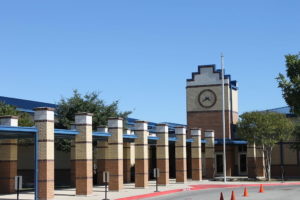Texas hiring more uncertified public-school teachers to fill vacancies
Amanda Garza McIntyre knows firsthand the challenge of major career transitions while balancing the ongoing needs of parenthood.
The mom of five completed a teacher preparation program in…

Amanda Garza McIntyre knows firsthand the challenge of major career transitions while balancing the ongoing needs of parenthood.
The mom of five completed a teacher preparation program in Brazosport ISD, a Texas school district, before leaving her job as a construction company administrative assistant.
“I don’t know that I would have fully committed to going into teaching without knowing that I had that training and that preparedness to walk into a classroom and feel confident,” McIntyre told the Texas Tribune. She now teaches 8th-grade science at Freeport Intermediate School.
Since the passage of a 2015 law, Texas has seen its number of uncertified teachers like McIntyre rise by 29%, according to the Tribune’s Jaden Edison. About 38% of last year’s newly hired instructors were uncertified.
Giving schools more flexibility
“The District of Innovation law was meant to give traditional public schools some of the flexibility that charter schools had long enjoyed, granting them exemptions from mandates on class sizes, school start dates and certification requirements,” Edison writes.
“Before, uncertified educators in Texas could teach core classes only after obtaining waivers and permits approved by the state education agency on a case-by-case basis.”
Now districts can apply for “District of Innovation” status, which exempts them from certain sections of the Texas Education Code if approved.
“Many districts have sought an exemption from the state’s teacher certification requirements to help combat their teacher shortages,” Edison explains.
The program McIntyre completed offers multiple benefits, including a paid residency for candidates and a teacher mentor to guide them in the classroom for a school year, according to the Tribune.
“The Brazosport ISD program allows aspiring teachers to earn a bachelor’s degree, teacher certification or both — at no cost. In return, program participants have to work in the district for at least three years.”
Some public-school advocates have criticized the increase in uncertified teachers, raising concerns over qualifications and classroom practice.
“It’s not serving students to put people in those positions that don’t have the experience they need to be successful,” said Priscilla Aquino-Garza, senior director of programs for Educate Texas, which works to address educational gaps and promote equity for underserved students.
However, other educational professionals such as Sam Cofer, Jubilee Academies’ chief operating officer, have worked firsthand with uncertified teachers to fill vacancies.
Jubilee Academies, a charter school district in San Antonio, provides instructional coaches to help new hires adjust to the classroom setting. Its percentage of uncertified teachers has increased from about 17% to 66% since 2015, according to the Tribune.
While teacher certification has its benefits, “I also can’t be dismissive of the skill sets that may come along with people that don’t go through those programs that could also end up being effective teachers with the right amount of coaching and mentoring and guidance,” Cofer said.
Apprenticeship programs can also help teachers “who are not certified but qualified,” said Shalona McCray, assistant superintendent of Human Resources and Community Relations for Longview ISD in East Texas.
“They have a bachelor’s degree, they have a passion,” she said, “and then we’ll do everything we can to help them.”



